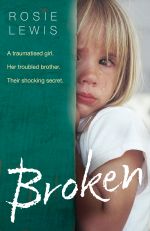Правообладателям!
Представленный фрагмент книги размещен по согласованию с распространителем легального контента ООО "ЛитРес" (не более 20% исходного текста). Если вы считаете, что размещение материала нарушает ваши или чьи-либо права, то сообщите нам об этом.Читателям!
Оплатили, но не знаете что делать дальше?
Текст бизнес-книги "Broken: A traumatised girl. Her troubled brother. Their shocking secret."
Автор книги: Rosie Lewis
Раздел: Жанр неизвестен
Текущая страница: 1 (всего у книги 3 страниц)

Copyright
Certain details in this story, including names, places and dates, have been changed to protect the family’s privacy.

HarperElement
An imprint of HarperCollinsPublishers Ltd
1 London Bridge Street
London SE1 9GF
www.harpercollins.co.uk
First published by HarperElement 2017
FIRST EDITION
© Rosie Lewis 2017
Cover layout design © HarperCollinsPublishers
Cover photograph (posed by model) © Images by Tracy/Alamy Stock Photo
A catalogue record of this book is available from the British Library
Rosie Lewis asserts the moral right to be identified as the author of this work
All rights reserved under International and Pan-American Copyright Conventions. By payment of the required fees, you have been granted the nonexclusive, non-transferable right to access and read the text of this e-book on screen. No part of this text may be reproduced, transmitted, downloaded, decompiled, reverse engineered, or stored in or introduced into any information storage retrieval system, in any form or by any means, whether electronic or mechanical, now known or hereinafter invented, without the express written permission of HarperCollins e-books.
Find out about HarperCollins and the environment at
www.harpercollins.co.uk/green
Source ISBN: 9780008242800
Ebook Edition © December 2017 ISBN: 9780008242817
Version: 2018-11-05
Contents
Cover
Title Page
Copyright
By the same author
Prologue
Chapter One
Chapter Two
Chapter Three
Chapter Four
Chapter Five
Chapter Six
Chapter Seven
Chapter Eight
Chapter Nine
Chapter Ten
Chapter Eleven
Chapter Twelve
Chapter Thirteen
Chapter Fourteen
Chapter Fifteen
Chapter Sixteen
Chapter Seventeen
Chapter Eighteen
Chapter Nineteen
Chapter Twenty
Chapter Twenty-One
Chapter Twenty-Two
Chapter Twenty-Three
Chapter Twenty-Four
Chapter Twenty-Five
Chapter Twenty-Six
Chapter Twenty-Seven
Chapter Twenty-Eight
Chapter Twenty-Nine
Epilogue
Helpful Reading
Also available
Moving Memoirs eNewsletter
About the Publisher
By the same author
Helpless (e-short)
Trapped
A Small Boy’s Cry (e-short)
Two More Sleeps (e-short)
Betrayed
Unexpected (e-short)
Torn
Taken
Prologue
July 2014
Archie opens his eyes and blinks. For a second he wonders where he is, then he realises and his tummy flips over. Something hard is digging in his side. It feels cold and pointy, like one of his Transformers. There’s something wrong with his back as well. Not an ache exactly, but it feels funny and wrong.
Cold, that’s what it is. He tries rolling over but a pain shoots down his shoulder and his head begins to hurt. It feels as if his skin is stuck to the wooden floor. Where’s his top? He can’t remember taking it off but his brain is fuzzy. He shakes his head and tries to think. If he can just get back to his room, maybe he can work it out. There’s a clinking noise as he tries to roll again. He freezes and holds his breath. As his eyes adjust to the half-light he realises there’s a pile of empty glass bottles wedged between his body and the bed.
He begins to ease himself away but stops suddenly and cocks his head. Someone is snoring, someone close by, and there are other sounds as well. Softer sounds. Like people breathing in and out. How many, he can’t tell. He tries to keep track but all the sounds keep tripping over each other and mixing him up.
If there are just two or three of them he might risk creeping back to his room – he wants to check that Bobbi’s okay – but if there are more and one of them wakes up … no, he can’t chance it. Not after what happened before.
If only he could decide what to do.
And then it starts. A stirring. A swishing noise, then a thud. A wire of fear flashes through his tummy. Strange scary shadows rise above him and he holds his breath, shrinking back into the cold floor.
The shapes move over one another, two, then three, then more. All making a tangled, groaning mess. There’s a strange smell as well. Sweat and booze and something musty that makes his throat burn. Then he hears a woman’s voice. She sounds sad, frightened. His stomach lurches and there’s a vile taste in his mouth. All he wants to do is run back to his room and to Bobbi. With a stab of shame, he realises that he’s too frightened to move.
The shadows and the noises, they make him feel sick, make his tummy roll. Somehow, though, he can’t tear his eyes away. Biting down on his lower lip, silent tears roll down his cheeks.
Chapter One
‘You can’t miss it, love,’ the elderly gentleman assured me, pointing towards the complicated one-way system I’d just escaped from. It was New Year’s Day 2015 and I was on my way to meet a nine-year-old boy named Archie Brady and his five-year-old sister, Bobbi. The siblings had been temporarily accommodated by Joan Oakley, a foster carer who had accepted the referral four days earlier. ‘Follow the road round as far as the greengrocer’s then take an immediate left. Straight over the next roundabout, under the railway bridge and Bob’s your uncle.’
I thanked him distractedly, trying to get my bearings. I performed a U-turn on the icy road, hoping that this time I wouldn’t get tangled up in the endless maze of side streets around the town centre. It was already 10 a.m. and I wanted to have a quick handover chat with Joan and make it back home before lunchtime. One thing I’ve learned over the last twelve years of fostering is that car journeys and fretful children are a toxic mix. Adding hunger to the equation would be a bit like tossing a stick of dynamite into the interior of my Fiat and hoping for the best.
The children were bound to feel uncertain about another move so quickly after the last and I wanted to do everything I could to lessen their anxiety. It’s generally acknowledged that any change in carer should take place as early in the day as possible. That way the child has a chance to acclimatise to their new surroundings before climbing into an unfamiliar bed.
Joan was keen to bring an end to the unexpected placement as well, by all accounts. ‘She’s tearing her hair out’ were the actual words the social worker from the placements team used when I spoke to her the day before. Apparently Joan already had her hands full caring for a baby with neonatal abstinence syndrome (NAS). She had agreed to take the siblings as a favour after the out-of-hours team had been unable to get hold of the foster carer on their emergency rota.
Like me, Joan was a short-term or task-based foster carer. Our ‘job’ is a temporary one but placements can last anything from one night to four years. Short-term foster carers support the child from the moment they’re removed from home and through the uncertain stage when their birth family is being assessed by the local authority. Once a final judgment has been made by the courts, foster carers help to manage the child’s transition either back to their birth family or onto permanency with long-term foster or kinship carers or an adoptive family.
At least, being a bank holiday, the roads were free of the usual weekday traffic, and I arrived at Joan’s house a little over ten minutes later. As I walked across her driveway, where a Ford Focus full of child car seats was parked, my eye was drawn by the flicker of a curtain at one of the windows on the second floor. I looked up as I rang the doorbell and caught a glimpse of blonde hair.
‘Rosie, you’re just how I pictured you,’ Joan said warmly, holding the door open with one hand, the other cradled around the small bump strapped to her chest. Around sixty or so, Joan wore a cheery expression, despite the dark circles under her eyes. We had never met before, but knew of each other through a social worker who worked at Bright Heights, the fostering agency I was registered with. I had heard that Joan was a well-respected carer and rarely had a vacancy.
‘Sounds ominous,’ I joked as I wiped my feet on the doormat. Joan smiled and bobbed her way along the hall to the sitting room. It was a routine I’d been through several times before with newborns who were withdrawing from drugs. Babies with substance addiction – known as neonatal abstinence syndrome – often need the constant comfort of a cuddle during their first few weeks of life because the pain of withdrawal, the jitters, stomach cramps and fever can be intense.
The sitting room was cosy, the lights woven around the mantelpiece casting a cheery glow on the peach-coloured walls. There was no sign of the siblings, but distant chatter and a thump overhead suggested they were upstairs. I nodded towards her middle. ‘You’ve got a tiny one there.’
She eased the sling down an inch. I caught a glimpse of dark hair and the tiny curve of a delicate ear before the baby began to squall and Joan was on the move again. ‘Two weeks old and still only five pounds,’ she said, swinging her shoulders from side to side. ‘I heard you’d adopted recently. Megan, isn’t it? How’s she doing?’
News travelled with surprising speed around fostering circles. When Megan’s adoption was finalised in June 2014, I had been touched to receive congratulatory cards from lots of foster carers, some of whom I had only met once or twice. Like Joan’s new charge, Megan, now three and a half, had been born addicted to drugs. She suffered painful withdrawal symptoms and was barely out of my arms during her first few weeks of life.
Like me, my birth children, Emily and Jamie, then sixteen and thirteen, had grown increasingly attached to her, and vice versa. When Megan’s social worker suggested that I throw my hat into the ring for assessment as her adopter, I had jumped at the chance. ‘She’s a right little pickle,’ I said, remembering this morning’s meltdown over a major misdemeanour of mine – cutting her toast into triangles instead of squares. ‘But she’s our little pickle. We wouldn’t be without her now.’
The pouches beneath Joan’s eyes creased as she smiled. ‘I heard it was touch-and-go for a while.’
I blew out some air and nodded. It was true. After being turned down as an adopter for Megan because of safety concerns (her birth family knew where I lived), we went through the difficult process of moving her onto adoptive parents. The placement broke down and she returned to us a few weeks later, but the move had left its mark. Megan was still fearful of separation, even for short periods. Getting her settled at nursery in September had been a challenge. For the first few weeks she became so distressed at drop-off time that I decided to stay with her.
By the end of the winter term she was managing four mornings and one longer day a week on her own, but still clung to me before she went in. Fortunately the staff were amazing. They grew teary when I explained Megan’s background and always made an extra special effort to welcome her. ‘To be honest I forget she’s adopted most of the time.’
Joan smiled. ‘Make yourself comfortable, if you can find a space. You won’t mind if I don’t join you?’
‘Knock yourself out,’ I said with a chuckle, and then, ‘Oh dear, Joan, your poor back.’ I couldn’t actually find a space to sit down. Strewn across the sofa were several half-opened packets of wet wipes, a few unused nappies, a cellular blanket, a couple of children’s magazines and various other toys. ‘I’ll perch here, shall I?’ I gestured to the arm of the sofa.
She grimaced. ‘Sorry, Rosie. But you know how tough it is.’
I waved her apology away. ‘Joan, you’re dressed. That’s a miracle in itself.’
She came to a stop a few feet in front of me and gave me a grateful smile. ‘Talking of tough … you’re looking for a new challenge, are you?’
‘Ha, well … how much of a challenge are we talking about?’
She blew out some air. ‘Have you ever seen Armageddon?’
I laughed. ‘Oh, Joan, don’t.’ She didn’t laugh back, just half-cocked an eyebrow. ‘What? That bad?’
‘Put it this way,’ she said, glancing at the door and lowering her voice. ‘I’ve only had them a few days and I’ve been distracted, so it’s difficult to tell how much is boredom, how much is down to the shock of the move and – well, you’ll see for yourself soon enough. I mean, Archie’s been fairly quiet …’
She stopped at the sound of footsteps. Moments later a young girl burst into the room. As soon as she caught sight of me she came straight over and laid her head on my lap. My stomach clenched with pity. I glanced at Joan. She gave me a meaningful look and said something inaudible out of the corner of her mouth.
Being overfamiliar with strangers isn’t unusual behaviour for children from chaotic backgrounds. While some children with a history of trauma and neglect withdraw into themselves, others trust no one to keep them safe and take matters into their own hands. Bobbi was probably trying to minimise any threat I posed by making herself appear both appealing and vulnerable. It was the reptilian part of her brain at work; her own little fight for survival. ‘Hello. You must be Archie?’
She lifted her head. ‘Huh?’
I gave her a teasing smile. ‘Pleased to meet you, Archie.’
She giggled. ‘I’m not a boy! I’m Bobbi!’ She was a pretty girl with deep-set brown eyes and pale, barely-there eyebrows. Her complexion was pallid though, and she looked far too thin.
‘Oh, of course you are,’ I said, smiling. ‘Silly me.’ There was a flicker of movement across the room. I half-registered a boy standing in the doorway. ‘This must be your sister then?’
As I turned towards him I was struck by a flash of recognition. I ran my eyes over his wavy brown hair and the pale skin of his thin face and then I remembered where I’d seen him before. I had helped out on a domestic violence workshop for children a few months earlier and Archie had been one of the attendees. He had stuck in my mind because when the social worker asked the children at the end of the session what they had enjoyed most about the course, Archie had answered, ‘The biscuits.’
Already classed as ‘children in need’ by the local authority following episodes of domestic violence between their mother and her partner, the comment had heightened professionals’ concerns over the siblings’ welfare, particularly as both were very small for their respective ages. As many as three children die each week in the UK through maltreatment and the biscuits comment, while far from definitive proof of neglect, was certainly something to jangle already twitching nerves.
I decided not to say anything about recognising him. He certainly didn’t need reminding of his past – ‘Coo-ee! I was there when you were at one of the lowest points in your life. Remember me?’
‘Archie,’ Joan said. ‘This is Rosie, love.’
He took a few steps into the room, his sister giggling a high-pitched cackle in front of me. ‘I think I know you. Weren’t you on that course I went to?’
‘Yes, that’s right. Lovely to see you again, Archie. You’re both coming to stay with me, then?’ They nodded in unison, Bobbi beginning to spin around on one leg. ‘That’s good. My children can’t wait to meet you.’
‘How many have you got?’ Archie asked as Bobbi lowered her head back to my thigh. Singing loudly, she grabbed the arm of the sofa and began running on the spot, head-butting me in the process. I put a hand on each of her shoulders and gently eased her away. She frowned at me then threw herself backwards onto a nearby footstool and made loud panting noises.
‘I have two daughters,’ I said, ignoring the sideshow and focussing my attention on Archie. For a brief second I pictured myself through his eyes; a woman in her mid-forties with shoulder-length, wavy blonde hair and hazel, slightly tired eyes, ones that hopefully displayed the promise of kindness. ‘Emily is twenty and studying to be a nurse, Megan’s going to be four in July, and then there’s Jamie. He’s seventeen.’
‘I want to be a nurse, Joanie!’ Bobbi shouted from the footstool. ‘Joanie, Joanie, I’m going to be a nurse one day!’
I decided now was as good a time as any to mention the new love in our lives and the latest addition to our family – a six-month-old pup whom Megan had named Mungo. A mongrel pup with some Spaniel and, I suspected from all the holes he’d dug in the garden, some Terrier as well, he was almost as effusive in his affection as little Megan. Although we all loved animals, I had resisted getting a pet because Jamie suffered from asthma. His symptoms had lessened over the years though, and so a few months ago we decided to take the plunge. ‘We also have a dog who’ll be very pleased to meet you,’ I said, aware that Joan was trying to calm Bobbi, who didn’t seem open to the idea at all. Alternately barking and lapping open-mouthed at the air, it was as if Joan wasn’t even there.
Archie smiled when I told him Mungo’s name, though his eyes kept an expressionless quality, as if they weren’t quite plugged in with the rest of him. ‘Does your son like football?’
‘Yes. He loves cricket and rugby as well. How about you?’
He nodded sombrely. ‘I support Man U.’
Before I could respond, Bobbi bolted off the foot stool and charged at him. Head down, she rammed him in the groin with such ferocity that he staggered backwards and clonked his head on the wall. He yelped, arms flailing as he struggled to regain his balance. Then, in a display of what I considered to be remarkable self-constraint, he gave her a mild push in the chest and then cradled his head, his other hand clamped to his groin.
I winced. Joan marched forwards. ‘What have I told you, Bobbi?’ she said crossly. ‘You mustn’t keep lashing out like that!’
Bobbi looked vacant, as if nobody had said a word. Joan took another step towards her and leaned close. ‘Bobbi! Did you hear me?’ she demanded. From her middle came the tiniest mewing sound. Joan straightened, shifting once again from one foot to the other. ‘Poor Archie, look, you’ve hurt him. Say sorry. NOW please!’
‘S’alright, Joan,’ Archie said, still rubbing the back of his head. ‘She didn’t mean it.’
‘Hmm, I’m not so sure about that.’ Joan puffed out some air. ‘Bobbi, upstairs. Fetch your things.’
After a resentful glance at her brother, Bobbi turned and stalked from the room. Archie rolled his eyes and limped after her. Joan gaped at me, her hand flapping towards the door. ‘Did you see that?! I don’t believe it!’
‘What? The head-butt?’
She snorted. ‘No, I can believe that alright. I can’t believe she actually did what I asked.’
I looked at her. ‘The placing social worker said you’re thinking ADHD.’
‘Yes, wouldn’t surprise me,’ Joan said. Attention deficit hyperactivity disorder is a prevalent condition in fostered children. Latest research suggests that there may be a genetic link and one emerging theory is that undiagnosed sufferers turn to drugs in an unconscious attempt at self-medication. It’s one of the reasons I feel sorry for birth parents who lose their children through substance addiction, although my sympathy never extends to those who have been deliberately cruel or abusive. ‘She’s all over the place from morning till night,’ Joan continued. ‘Can’t keep still for a second. Can’t stop fretting about food either, poor little lamb. She can’t sleep. And when she blows, well, you’ll need to dive for cover. She never stops making a noise. I mean, literally never. She’s a little tea leaf as well.’
‘Oh?’
Joan nodded. ‘Yep. Pinches anything that’s not screwed down. And she bites.’
I nodded slowly, absorbing her words. This placement was certainly going to be lively. ‘And Archie?’
She thought for a moment. ‘I haven’t quite worked him out yet. He’s polite enough, I’ll give you that. And on the whole he’s been quiet.’
‘Yes, you’ve said.’
She nodded, glancing down at the baby.
‘What is it, Joan?’
She frowned. ‘I’m not sure,’ she said, giving me a long steady look. ‘Be careful is what I’m saying, I suppose, with your little one around.’
I stared at her for a moment and then glanced away. My eyes were drawn to a lopsided Christmas tree draped with cracked baubles and balding tinsel. It was leaning cheerlessly against a side table, as if all the socialising of the festive season had literally drained the life out of it. Joan noticed my interest. ‘One of Bobbi’s recent victims,’ she said soberly. I laughed, but she shook her head woefully. ‘I’m not joking, Rosie. Be ready to hit the ground running. You’re in for a bumpy ride.’
If I’m honest her words did worry me a little, but perhaps not as much as they should have.
Правообладателям!
Представленный фрагмент книги размещен по согласованию с распространителем легального контента ООО "ЛитРес" (не более 20% исходного текста). Если вы считаете, что размещение материала нарушает ваши или чьи-либо права, то сообщите нам об этом.Читателям!
Оплатили, но не знаете что делать дальше?







